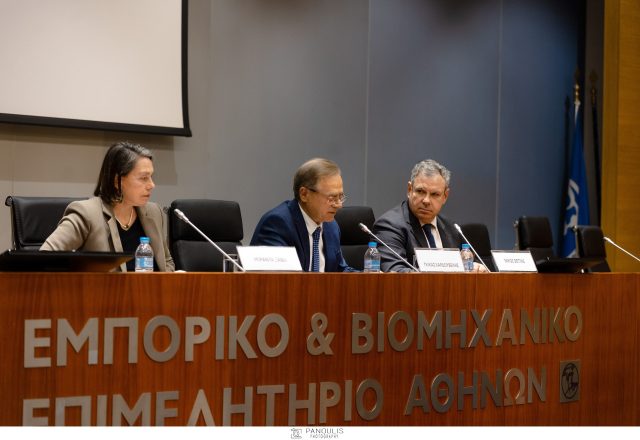
“Aspects of Greekness”
A debate on “Aspects of Greekness” was co-organized by
KERKYRA publications-economia Publishing & Hestia Publications,
at the Museum City of Athens, around three books
by Giorgos-Stylianos Prevelakis,
«Return to Athens – Urban Planning and Geopolitics of the Greek Capital»
(Greek edition by Hestia Publications)
«Wooden Walls – The geopolitics of Greek networks»
(Greek edition by KERKYRA publications–economia Publishing)
«Who are we – The geopolitics of Greek identity»
(Greek and English edition by KERKYRA Publications–economia Publishing).
In his welcome address, Antonis Vogiatzis, President of the Museum of Athens, and in their greetings, Alexandra K. Vovolini on behalf of KERKYRA Publications and Nikos Karapidakis of HESTIA Publications stressed the importance of continuous research and the quest for identity and belonging of Greeks, in a direction of openness and acceptance of future challenges.




Dimitris Economou, Emeritus Professor of the University of Thessaly and President of the National Archaeological Museum, focused on Prevelakis’ own path leading from urban planning to geopolitics.
The example of Athens, with the fragmentation of properties, the arbitrary and order-less construction, the distance from every legislated approach to effective reality and in any case small owners’ reactions to any organized urban planning, constitutes a typical case of extracting surplus value from the land.

According to Thodoris Pelagidis, Professor at the University of Piraeus and deputy governor of the Bank of Greece, in urban planning we experienced a phenomenon of applied populism in zoning, with successive forms of demagoguery manifest at any turn.
Τhe large State has led to rent-seeking and “permanent co-governance with groups of interest”. «In the overall search of “Who are we?”, such ingrained profiteering reflex also has a role», he argued.

Minister of Education Kyriakos Pierrakakis, referred to a “Prevelakis Trilogy”, with visible internal coherence and “contribution to national self-awareness”. He added that Greeks are called throughout time to answer the question “Who are we?” – but always have to do so in an inventive and extroverted way.
The present digital age, the age of networks, the resulting fading of borders create opportunities, but also challenges in the Greek case.

Evanthis Hatzivasileiou, Professor of the Athens University and Secretary General of the Greek Parliament Foundation for Parliamentarism and Democracy, concurred that the three Prevelakis books form an overall, integrated system of thought. The geopolitics of Greek networks «at a time when the very concept of territoriality is beginning to wane», together with the finding that Hellenism has always functioned best in non-territorially defined situations, explains the Prevelakis approach to the functioning of nations such as the Greek one: Instead of the typical “tree” structure (with a central trunk, having branches but a fixed center) he adopts a “galactic”, radial structure. In this sense, “Who are we?” leads to the acceptance of network Hellenism.

In the discussion that followed, Giorgos Prevelakis had the opportunity to unfold his reasoning. He described the gradual overcoming of the Westphalian State set-up where the element of territoriality prevails, as it is challenged today by both economics and demography. He wondered about the role of the State in such evolving networks and about the kind of initiatives that would help to make best of new possibilities offered.








